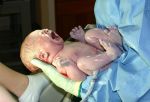Originally posted on May 5, 2009
In the previous post I provided some background information on the epigenome and its importance in gene expression. Today I’m going to tell you about how the epigenome responds to the environment and how this can have long-term effects on stress responsiveness.
The epigenetic effects of maternal care in rats
 In rats and many other organisms, females vary in the quality and quantity of care that they provide to their offspring. Researchers in the Meaney lab used this fact to split rat mothers into two different groups. The high maternal care group consisted of mothers who licked and groomed their offspring often and engaged in lots of arched-back nursing. The low maternal care group of mothers engaged in these behaviors far less frequently. When the offspring from these two types of mothers became adults, significant differences in stress responsiveness were observed.
In rats and many other organisms, females vary in the quality and quantity of care that they provide to their offspring. Researchers in the Meaney lab used this fact to split rat mothers into two different groups. The high maternal care group consisted of mothers who licked and groomed their offspring often and engaged in lots of arched-back nursing. The low maternal care group of mothers engaged in these behaviors far less frequently. When the offspring from these two types of mothers became adults, significant differences in stress responsiveness were observed.
As adults, the offspring of mothers who engaged in lots of maternal care exhibited significantly fewer anxiety-like behaviors when placed in a new environment than the offspring of mothers who provided less care (Caldji et al. 1998). The less anxious offspring explored more of a new environment and began eating food in this new environment sooner than their more anxious counterparts.
At this point, it was still possible that genetic and not epigenetic differences were responsible for differences in stress responsiveness. To control for this possibility, offspring that were born to mothers who provided a lot of care were taken from their biological mother and were instead raised by a mother who provided little care (and vice versa). This study (Francis et al. 1999) coupled with future work identifying the specific epigenetic mechanisms at play made it clear that maternal care behaviors were directly affecting stress-responsiveness through epigenetic means. The offspring of high care mothers raised by low care mothers acted the same as the biological offspring of low care mothers who were raised by their own low care mother.
 Further studies determined that maternal care behaviors experienced by offspring during their first week of life were affected methylation and acetylation patterns in the promoter region of the glucocorticoid receptor in the hippocampus (Weaver et al. 2004). These epigenetic patterns are stable, indicating that the way the rat pups are treated during their first week of life will be recorded epigenetically and will influence the way that they respond to stress both behaviorally and endocrinologically for the rest of their lives.
Further studies determined that maternal care behaviors experienced by offspring during their first week of life were affected methylation and acetylation patterns in the promoter region of the glucocorticoid receptor in the hippocampus (Weaver et al. 2004). These epigenetic patterns are stable, indicating that the way the rat pups are treated during their first week of life will be recorded epigenetically and will influence the way that they respond to stress both behaviorally and endocrinologically for the rest of their lives.
This leads to an interesting question: Are these results applicable to humans?
Epigenetic effects of maternal care in humans
 Studies in humans have revealed results similar to those found in rats. Mothers who are depressed or anxious during their third trimester produce offspring who express methylation patterns in the promoter region of their glucocorticoid receptors which mirror the patterns found in rats (Oberlander et al. 2008). The researchers in this experiment were limited to exploring cord blood cells (blood found in the placenta or umbilical cord) instead of cells in the hippocampus (the type of cells examined in the rat studies) because it clearly would have been unethical to extract brain cells. Despite this limitation, theydid find that the methylation patterns were exactly as scientists had predicted they ought to be.
Studies in humans have revealed results similar to those found in rats. Mothers who are depressed or anxious during their third trimester produce offspring who express methylation patterns in the promoter region of their glucocorticoid receptors which mirror the patterns found in rats (Oberlander et al. 2008). The researchers in this experiment were limited to exploring cord blood cells (blood found in the placenta or umbilical cord) instead of cells in the hippocampus (the type of cells examined in the rat studies) because it clearly would have been unethical to extract brain cells. Despite this limitation, theydid find that the methylation patterns were exactly as scientists had predicted they ought to be.
Saliva samples revealed that cortisol (a stress hormone) levels at three months of age were associated with the methylation patterns observed at birth, indicating that the observed methylation patterns in humans were indeed linked to stress responsiveness in a manner similar to those observed in rats.
Perhaps most eye-opening have been the studies which looked at methylation patterns in hippocampal glucocorticoid receptors in individuals who have committed suicide. We’ve known for a long time that the victims of child abuse respond differently to stress and are at a greater risk of suicide than unabused children. A postmortem study of suicide victims who were abused as children revealed hippocampal methylation patterns similar to those found in the high stress rats from low maternal care mothers, a pattern that was not found in unabused controls (McGowan et al. 2009).
Conclusion
The parallels between the rat and human studies make it fairly clear that overly anxious or abusive parents can have long-term epigenetic effects on the way their offspring respond to stress. Fortunately, researchers studying rats are finding ways to reverse epigenetic patterns and their associated effects, often by administering drugs containing compounds found in common foods (Weaver et al. 2005; Weaver et al. 2006). At the moment, no guidelines have been set for how diet changes can be made in the hope of altering the way one responds to stress.
We’ve known for some time that early life experiences can have profound long term effects on behavior. Understanding the mechanisms underlying these long term effects can help us avoid (for example, by monitoring and treating a mother’s psychological condition while pregnant if necessary) and maybe even one day reverse epigenetic programming that results in anxiety and frequent feelings of acute stress.
Tomorrow’s post will focus on how the environment interactions with the epigenome to effect reproductive behaviors.

Leave a Reply